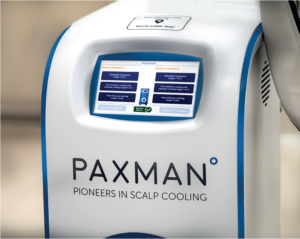ESMO guidelines recommend scalp cooling to prevent chemotherapy-induced alopecia
The European Society for Medical Oncology (ESMO), the leading professional organisation for medical oncology, has updated the Clinical Practice Guidelines for Dermatological Toxicities Related to Anticancer Agents to include the recommendation of scalp cooling for the prevention of chemotherapyinduced alopecia (CIA) as a Category IIB recommendation.
A multidisciplinary group of experts from institutions and countries across Europe, the USA and Australia authored the updated guidelines.
British Scalp cooling expert Paxman – whose pioneering cold cap system has helped over 100,000 cancer patients worldwide to retain their hair during chemotherapy – welcomed the recommendation and its wider potential for positive change.
Richard Paxman, CEO of Paxman, commented: “Clinical Practice Guidelines effectively determine standards of care around the world and this adoption by ESMO will work towards a positive change in the supportive cancer care landscape. Paxman are the scalp cooling provider for many leading cancer centres throughout Europe and this update will serve to the continuation of our international mission in eliminating hair loss from chemotherapy and thus change the face of cancer.”
Chemotherapy-induced hair loss is widely recognised as one of the most traumatic side effects associated with cancer treatment. Scalp cooling, or the ‘cold cap’, works by lowering scalp temperature before, during and after the administration of chemotherapy to alleviate the damage caused to the hair follicle, thus helping patients to retain their hair during treatment.
Paxman’s Scalp Cooling System provides a clinically proven hair loss prevention system for cancer patients undergoing chemotherapy. The system is used at a large number of cancer centres and hospitals in Europe, North-, Central- and South America, Asia and Oceania, and is responsible for helping patients keep their hair during chemotherapy.
Of the various interventions proposed for the prevention of chemotherapy-induced alopecia, scalp cooling has emerged as the most effective(1). However, clinicians are advised that in the case of limited prophylactic or therapeutic options to prevent, or treat, alopecia, it is essential to inform patients about this adverse event before commencing therapy and to speak about aids. The Guidelines also note that scalp cooling may be less effective with anthracycline-containing regimens.
ESMO Clinical Practice Guidelines for Dermatological Toxicities Related to Anticancer Agents:
www.esmo.org/guidelines/supportive-andpalliative- care/prevention-and-managementof- dermatological-toxicities-related-toanticancer- agents
For more information, visit:
paxmanscalpcooling.com


